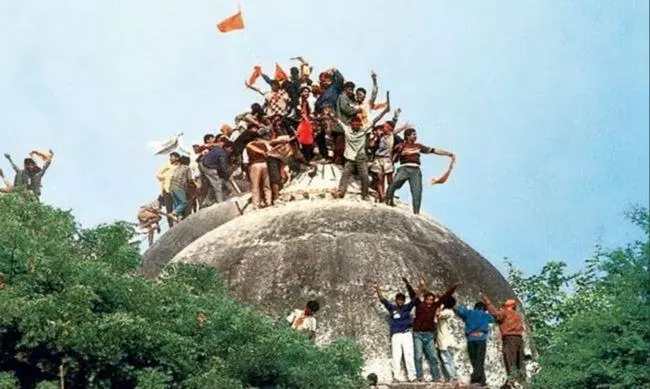
SC did no justice to secularism in Babri Masjid cases: ex-SC judge
text_fieldsNew Delhi: Former Supreme Court Judge, Justice RF Nariman, opined that the top court did not do justice to secularism in the case of the Babri Masjid dispute over the years, particularly in its final judgement in 2019, allowing the Hindu side to construct a temple at the site where the mosque was demolished, Live Law reported.
Live Law quoted the former judge, "In my opinion, a great travesty of justice was that Secularism was not given its due by these judgements.”
Justice Nariman was speaking at the First Justice AM Ahmadi Memorial Lecture on the topic of “Secularism and the Indian Constitution. Justice Ahmadi was involved in one of the cases regarding the Babri Masjid dispute.
Recalling the steps taken by the Indian government after the Babri Masjid demolition, Justice Nariman said that implementing the Acquisition of Certain Area at Ayodhya Act, 1993, the government decided that the status quo of January 7, 1993, be maintained in the case of the disputed site, allowing the Hindu Pujaris alone to do pray inside the structure.
In the case of maintainability of the status quo, as per the Acquisition Act, a five-judge bench of the top court pronounced the verdict, but the bench was sharply divided 3:2, and Justice Ahmadi was among the two who dissented the status quo. The two judges held that the Acquisition Act was against secularism.
Later, Nariman dissected the final verdict on the Babri Masjid dispute in 2019. The five-judge Supreme Court bench helmed by then Chief Justice of India Justice Ranjan Gogoi held that the entire disputed land of 2.77 acres is to be handed over to a Hindu trust, which may construct a Ram Mandir there. The court also ordered the government to allot an alternate 5 acres of land in Ayodhya limits to build a mosque. Then, in a contrasting view, the court noted that the demolition of the Babri Masjid in 1992 was an egregious violation of law.
Justice Nariman expressed his discontent over the apex court’s reasoning in its 2019 ruling in the dispute. The court had dismissed all the review petitions filed a month after its final verdict.
Nariman said that the mosque was built in 1528, and an initial dispute arrived only in 1853 under the British East India Company’s rule. When the British Crown directly took over the nation in 1858, it built a wall dividing the disputed land, allowing both Hindu and Muslim faiths to perform prayers. It was in 1949 that a mob of 50 to 60 people stormed the mosque and placed some idols inside, and Muslim prayers were stopped.
He said that the top court had noted in 2003 that there was no Ram Temple under the Babri Masjid structure, and Muslims were praying there from 1857 to 1949. But the court refused to say that the Muslims were in exclusive possession. As per the court, since the Hindu side made egregious attempts to take control of the land multiple times, the land is disputed.
“Since this side is now undisputed, we cannot say they have exclusive possession of the inner side. Therefore, this is one composite whole,” Nariman said about the court ruling. The court saw the entire disputed land as a composite and decided that it belonged to Hindus.
Nariman continued that an important finding regarding the Babari Masjid-Ram Janmabhoomi dispute was that it was the Hindu side that did things contrary to the rule of law, for which reparations were required. One would have thought that the reparation would have been rebuilding the demolished mosque, but what happened was the allotment of an alternate land for another mosque to be built by the Muslim side on their own.
“In my humble opinion, it was a great travesty of justice that secularism was not given its due at all by these judgments," Justice Nariman said.
Referring to the criminal case relating to the larger conspiracy in demolishing the historical structure of Babri Masjid, a judge acquitted all the accused, and he was honoured by appointing him as the Upa-Lok Ayukta of Uttar Pradesh.
“That is the state of affairs in our country,” Live Law quoted the retired judge.























